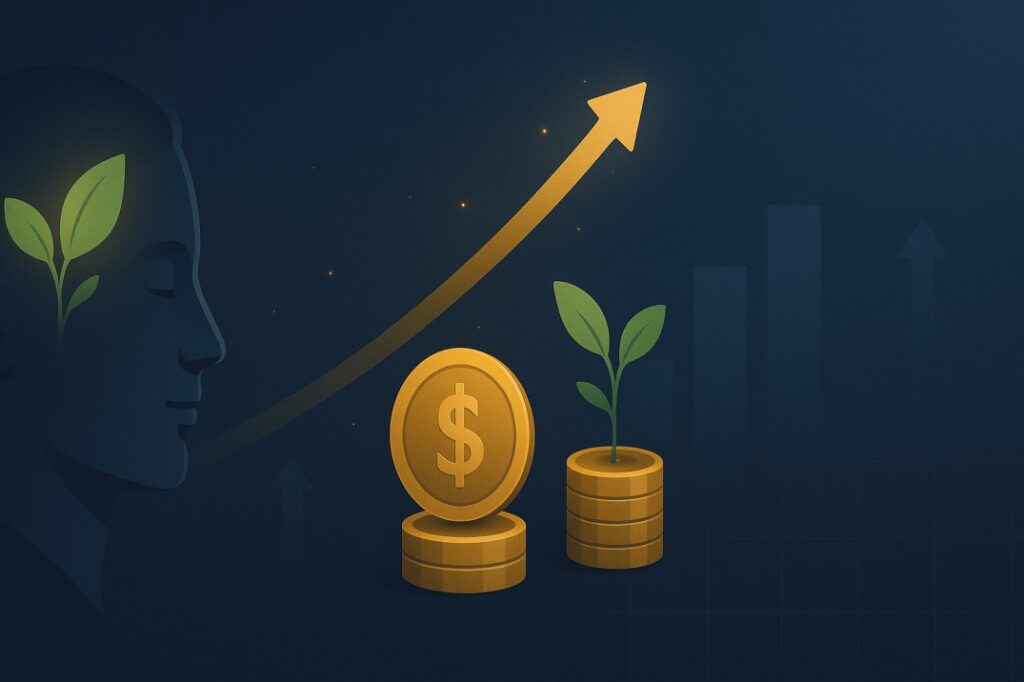The way we handle money today is often shaped by beliefs we picked up long before we were old enough to earn it, they’re rooted in the stories we heard, the struggles we saw, and the beliefs we absorbed when we were young, maybe you grew up hearing that money is hard to get or that wanting more is selfish.
These ideas stick with us and quietly shape how we earn, spend, save, or even dream, but here’s the good news: your money mindset isn’t fixed.
You can rewrite those beliefs and build a healthier, more abundant relationship with money that gives you more peace, freedom, and confidence, in this article we’ll walk through simple practical ways to shift your mindset and start creating a financial life that actually feels good.
Key Takeaways
- Your money mindset is shaped by your past experiences and beliefs.
- Recognizing limiting beliefs is the first step to changing your money mindset.
- Practicing gratitude can significantly improve your financial outlook.
- Building healthy financial habits is essential for long-term abundance.
- Surrounding yourself with positive influences can reinforce an abundant mindset.
Understanding Your Money Mindset
Defining Money Mindset
Okay, so what is a money mindset anyway? It’s basically your set of beliefs and attitudes about money and influences how you earn, save, spend, and even think about money.
This is not just about the numbers in your bank account, but about the thoughts and feelings you have towards those numbers, think of it as the lens through which you view your financial world, it can be positive, negative or somewhere in between, but it’s always there, shaping your financial decisions.
- It’s the foundation of your financial habits.
- It impacts your feelings of security.
- It influences your generosity.
Your money mindset is like the software running in the background of your financial life, it dictates how you react to financial situations and often without you even realizing it.
The Impact of Childhood Experiences
Ever wonder why you react a certain way to money? A lot of it goes back to childhood. What did you hear your parents say about money? Did they stress about bills, or did they seem comfortable?
These early experiences can have a huge impact on your financial behavior as an adult. If you grew up hearing
Shifting From Scarcity to Abundance

Identifying Limiting Beliefs
Okay, so you want to ditch that feeling of never having enough? First, you gotta figure out what’s holding you back.
These are your limiting beliefs, those sneaky thoughts that tell you things like “I’m not good with money” or “I’ll never be rich.” They’re often so ingrained that you don’t even realize they’re there, messing with your financial decisions.
Think back to how you grew up: What did your parents say about money? Were they always stressed about bills? Did they believe rich people were greedy?
These messages can shape your beliefs, even if you don’t agree with them consciously, write down any negative thoughts you have about money. Where do you think they came from? Once you know what they are, you can start challenging them.
Practicing Abundance Affirmations
Time to fight those negative thoughts with some positivity! Abundance affirmations are statements you repeat to yourself to reprogram your subconscious mind.
The key is to make them believable and relevant to your life, don’t just say “I’m a millionaire” if you don’t believe it. Start with something like “I am open to receiving more abundance in my life” or “I am grateful for the money I have.”
Here’s a simple way to start:
- Write down 3-5 affirmations that resonate with you.
- Say them out loud every morning and evening.
- Visualize what it feels like to have abundance in your life.
- Pay attention to how you feel when you say them, if you feel resistance, that’s a sign you need to work on that belief.
It might feel silly at first, but stick with it, over time these affirmations can help you shift your mindset and start attracting more abundance into your life.
Embracing a Generous Spirit
This might sound counterintuitive, but one of the best ways to cultivate an abundance mindset is to be generous. When you give, you’re signaling to the universe that you have enough to share, this doesn’t mean you have to give away all your money! It could be as simple as donating your time, offering help to a friend or buying someone a coffee.
Think about it: a scarcity mindset makes you want to hoard everything, afraid there won’t be enough, but an abundance mindset recognizes that there’s always more where that came from.
When you’re generous, you’re not only helping others, but you’re also opening yourself up to receive more in return, shifting from scarcity thinking to abundance thinking involves consciously choosing thoughts that promote abundance, each time a scarcity thought is repeated, it strengthens that mindset, while embracing abundance-oriented thoughts creates new opportunities and perspectives.
Cultivating Gratitude for Financial Growth
The Power of Gratitude
Gratitude can really change how you see your finances, it’s easy to get caught up in what you don’t have, but taking a moment to appreciate what you do have can shift your perspective.
This shift is super important for building a healthy money mindset, we are not talking about ignoring financial challenges, but about acknowledging your progress and the resources available to you. It’s about recognizing that even small steps forward are still steps in the right direction.
When you’re grateful, you’re less likely to make impulsive decisions based on fear or lack, it’s like hitting the pause button on panic and choosing to see the bigger picture. This can lead to better financial choices and a more positive outlook overall. Cultivating gratitude is often necessary for obtaining an abundance mindset.
Transforming Mindset Through Appreciation
Appreciation takes gratitude a step further, it’s about truly valuing what you have, not just acknowledging it.
This means appreciating the opportunities that come your way, the skills you possess, and the people who support you. When you appreciate these things, you’re more likely to use them wisely and make the most of them. For example, instead of focusing on how much you owe, appreciate the fact that you have a roof over your head and food on the table. Instead of dwelling on a missed opportunity, appreciate the lessons you learned and the new doors that may open.
By focusing on appreciation, you can transform your mindset from one of scarcity to one of abundance, it can be more effective to envision how setting and completing your goal will impact your life rather than focusing on the money mindset itself.
Building Empowering Financial Habits
All that mindset work is great, but it needs a solid foundation of good habits to really take root, think of it like planting a seed, the right mindset is the fertile soil, but you still need to water it and give it sunlight with consistent actions.
Creating a Budget with Abundance
Forget restrictive budgets that feel like a punishment. We’re aiming for a budget that reflects your values and supports your goals. This isn’t about deprivation, it’s about intentional spending.
Here’s how to build a budget with abundance in mind:
- Track your spending: Know where your money is actually going. Use an app, a spreadsheet, or even a notebook, the point is awareness.
- Prioritize your values: What truly matters to you? Allocate your money accordingly. If travel is your thing, make sure your budget reflects that.
- Include “fun money”: This is crucial! A budget that’s all restrictions is a recipe for failure. Set aside money for guilt-free spending on things you enjoy. Maybe it’s a wine-and-paint night or a new gadget.
- Automate savings: Set up automatic transfers to your savings account, “pay yourself first” is a classic for a reason.
Investing in Yourself
Investing isn’t just about stocks and bonds, but also about investing in your own growth and potential. This is a key part of an abundance mindset.
Here are some ways to invest in yourself:
- Education: Take a course, attend a workshop, or get a certification. Learning new skills can open doors to new opportunities.
- Health: Prioritize your physical and mental well-being. This could mean joining a gym, seeing a therapist, or simply taking time for self-care.
- Experiences: Travel, attend concerts, or try new things. These experiences broaden your horizons and create lasting memories.
Investing in yourself is the best investment you can make, it pays dividends in terms of increased confidence, skills and overall well-being.
Setting Financial Goals
What do you want your money to do for you? Having clear financial goals is essential for staying motivated and on track.
Here’s how to set effective financial goals:
- Make them SMART: Specific, Measurable, Achievable, Relevant, and Time-bound. “Save more money” is vague but “Save $5,000 for a down payment on a house within two years” is SMART.
- Break them down: Large goals can feel overwhelming, break them down into smaller more manageable steps.
- Visualize success: Imagine yourself achieving your goals. How will it feel? What will it allow you to do? This can help you stay motivated when things get tough.
- Celebrate milestones: Acknowledge and celebrate your progress along the way. This will keep you feeling positive and encouraged, consider talking to a financial professional about your progress.
Surrounding Yourself with Abundance

When we think about abundance it’s easy to get caught up in our own heads, wondering about what we lack, but a huge part of shifting your money mindset involves the people and environments you choose to surround yourself with.
Your social circle and the content you consume can significantly impact your financial well-being, it’s about creating an ecosystem that supports your journey toward abundance.
Choosing Supportive Relationships
Think about the people you spend the most time with, are they constantly complaining about money? Do they make you feel guilty for wanting to improve your financial situation or do they inspire you to dream bigger and take action? It might be time to re-evaluate some of those relationships.
- Seek out friends and family who are positive and supportive of your goals.
- Limit your exposure to people who drain your energy or perpetuate a scarcity mindset.
- Remember, it’s okay to set boundaries and protect your mental and emotional space.
Learning from Abundant Mindsets
One of the best ways to cultivate an abundance mindset is to learn from people who already have one. This doesn’t necessarily mean seeking out millionaires, it means finding individuals who approach life with optimism, generosity and a belief in their own potential, you can find inspiration in unexpected places.
Maybe it’s a local business owner who’s passionate about their work or a friend who always seems to find creative solutions to problems, always pay attention to how these people think and act and try to incorporate their principles into your own life. Consider incorporating mindfulness into your daily routine to better observe and learn from these individuals.
Engaging with Positive Communities
There’s power in numbers, connecting with like-minded individuals can provide a sense of belonging, encouragement and accountability. Look for communities, both online and offline, that focus on personal growth, financial literacy and abundance.
These communities can offer a safe space to share your struggles, celebrate your successes and learn from others’ experiences.
- Join online forums or social media groups dedicated to financial independence or positive thinking.
- Attend local workshops or seminars on money management or personal development.
- Volunteer your time to a cause you care about. Helping others is a great way to shift your focus from scarcity to abundance.
Surrounding yourself with abundance isn’t about chasing wealth or status, it’s about creating an environment that supports your growth, inspires your dreams and reminds you that anything is possible.
Overcoming Money Mindset Blocks
Even though it’s easy to fall into negative thought patterns about money, the truth is that we all do it at some point. The important thing is that those beliefs aren’t set in stone, with some reflection and intention you can start to shift the way you think and that shift can lead to real lasting change.
So now, let’s take a look at some of the most common mental blocks around money and how you can begin to move past them with clarity and confidence.
Identifying Common Blocks
What are some typical money mindset blocks?
Well, a big one is the scarcity mindset – that feeling that there’s never enough. This can lead to hoarding or conversely reckless spending because you feel like you need to grab what you can while you can.
Another block is fear of success, it sounds weird, right? But some people subconsciously sabotage themselves because they’re afraid of the responsibility or attention that comes with being financially successful.
Low self-worth can also play a huge role, if you don’t believe you deserve to be wealthy, you’ll find ways to stay broke. These financial obstacles can be tough to overcome.
Strategies to Break Through
Great! You’ve identified some blocks. Now what? First, awareness is key. Start paying attention to your thoughts and feelings about money. When do you feel anxious? When do you feel excited? What triggers those feelings? Once you’re aware, you can start challenging those negative thoughts.
For example, if you catch yourself thinking, “I can’t afford that,” ask yourself, “Is that really true? or am I just afraid to spend the money?” Another strategy is to practice gratitude, focus on what you do have, rather than what you lack.
This can help shift your mindset from scarcity to abundance. Finally, surround yourself with positive influences, read books, listen to podcasts and spend time with people who have a healthy relationship with money.
Reframing Past Money Mistakes
We all make mistakes with money, it’s part of life, but dwelling on those mistakes can keep you stuck in a negative cycle.
The key is to reframe those experiences and instead of beating yourself up, ask yourself what you learned from the mistake. How can you avoid making the same mistake again? See the mistake as a learning opportunity, not a personal failure. This shift in perspective can be incredibly powerful.
It’s important to remember that changing your money mindset is a journey, not a destination. There will be ups and downs, be patient with yourself, celebrate your progress and don’t give up. You’ve got this!
The Role of Mindfulness in Money Mindset

Practicing Mindful Spending
Okay, so mindful spending is not just about budgeting, but about being present when you’re actually spending. Like, really thinking about each purchase.
I used to just swipe my card without a second thought, but now I try to pause and ask myself if I really need something or if I’m just buying it because I’m bored or stressed. It’s surprising how often it’s the latter.
Awareness of Financial Triggers
We all have those things that make us want to spend money, for me it’s seeing ads for new tech gadgets. I don’t even need them, but the shiny newness just gets to me.
Identifying your financial triggers is key, once you know what they are, you can start to develop strategies for dealing with them, maybe it’s unsubscribing from certain email lists, or avoiding certain stores, whatever works for you.
Mindfulness Techniques for Abundance
Mindfulness isn’t just about spending, it’s about your overall relationship with money and about recognizing that money is a tool and not the source of all happiness. Here are a few things that have helped me:
- Meditation: Even just a few minutes a day can help calm your mind and reduce stress, which can lead to better financial decisions.
- Gratitude journaling: Writing down things you’re grateful for can help shift your focus from what you lack to what you have.
- Deep breathing exercises: When you feel triggered to spend, take a few deep breaths and ask yourself if it’s really what you want.
It’s about training yourself to be more aware of your thoughts and feelings around money, so you can make choices that align with your values and goals. This is not a quick fix, but it can make a big difference over time.
Wrapping It Up: Your Journey to Abundance
At the end of the day, shifting your money mindset isn’t some distant or abstract idea, it’s a real choice, one that can shape how you live, decide and dream.
Maybe you’ve never stopped to notice that some of your old beliefs about money are still calling the shots, but what if they don’t need to anymore? What if today is the moment to look at them with more awareness and a bit of compassion too?
Throughout this article, you’ve explored tools, reflections, and small steps that can lead to meaningful change, you don’t have to fix everything at once. Start simple: write down what you believe about money, ask yourself where those ideas came from, and whether they still make sense for the person you’re becoming.
Remember, it’s not about how much you have, it’s about how you see what you have and that shift in perspective can transform more than just your bank account, it can change how you relate to freedom, security and purpose.
This is an inside-out journey and you don’t have to walk it alone.
Frequently Asked Questions
What is a money mindset?
A money mindset is how you think and feel about money, it includes your beliefs about earning, saving, spending, and sharing.
How can I change my money mindset?
You can change your money mindset by identifying negative beliefs, practicing positive affirmations and surrounding yourself with supportive people.
What are limiting beliefs about money?
Limiting beliefs about money are negative thoughts that hold you back from achieving financial success, like thinking you will never have enough.
Why is gratitude important for financial growth?
Gratitude helps you appreciate what you have, which can lead to a more positive outlook on money and encourage you to attract more abundance.
How can I create a budget with an abundance mindset?
Creating a budget with an abundance mindset means focusing on your goals and how you can use your money to support your values and dreams.
What role does mindfulness play in changing my money mindset?
Mindfulness helps you become aware of your financial habits and triggers, allowing you to make better decisions and reduce stress around money.





